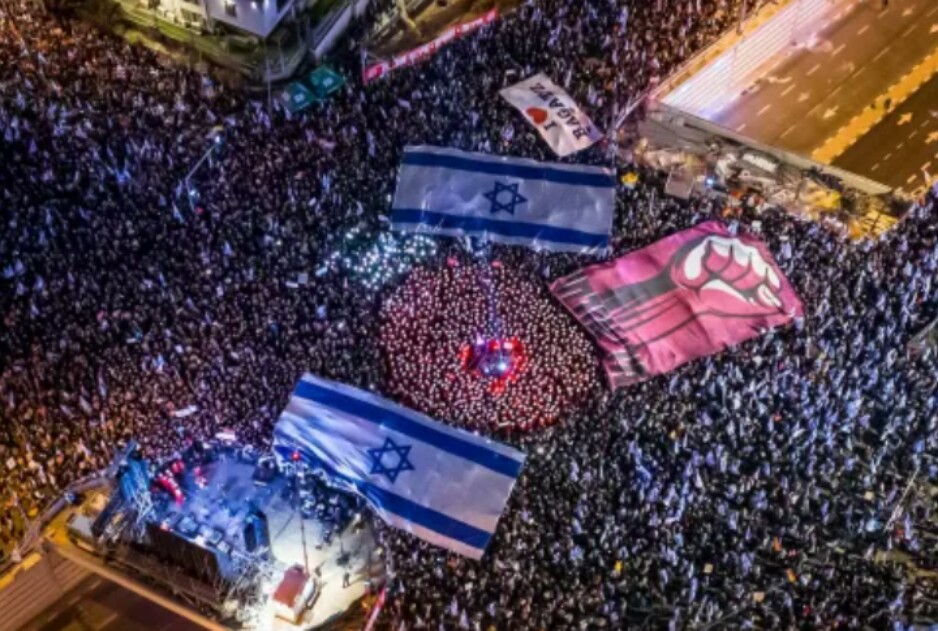Tel Aviv, MINA – Israeli protesters took to the streets again on Saturday to protest the coalition government’s judicial regulation, Anadolu Agency reports.
Demonstrators, who have organized mass protests every Saturday against the far-right coalition government’s judicial regulation and conservative policies led by Prime Minister Benjamin Netanyahu, were on the streets for the 31st straight week of protests.
Tens of thousands attended demonstrations in Tel Aviv, West Jerusalem, Haifa, Beersheba, Herzliya and Rehovot.
As usual, the most significant demonstration took place in Tel Aviv, where protesters gathered in front of the Government Complex on Kaplan Street and made speeches criticizing the regulation.
Also Read: Hundreds Rally in Stockholm to Condemn Israeli Attacks and Ceasefire Violations in Gaza
Protest leaders accused Netanyahu of attempting to undermine the rule of law and potentially causing a constitutional crisis.
Demonstrators holding Israeli flags chanted slogans in support of democracy and used drums, whistles and air horns to create rhythm.
Every week on Kaplan Street, a large banner with a main slogan is displayed. This week’s banner featured Netanyahu’s silhouette with the “100% lies” on it.
Demonstrations continued despite an armed attack that occurred in Tel Aviv.
Also Read: Mass Protests Erupt in Bologna Against Israeli Teams Ahead of EuroLeague Match
Not far from the protest area on Montefiore Street, an attack resulted in the deaths of a security officer and a Palestinian attacker.
Police and protest leaders announced that despite the armed attacks, the protests would continue safely.
In addition to Tel Aviv, demonstrators also gathered in front of Netanyahu’s residence on Azza Street in West Jerusalem where demonstrators held a banner that read: “Because of him, everything is burning,” referring to Netanyahu.
Opposition Leaders also participated in various parts of the country.
Also Read: UN Warns of Rapidly Worsening Humanitarian Crisis as Over 100,000 Flee Violence in Sudan
Justice Minister Yariv Levin announced Jan. 5, that the judicial reform, which included changes such as limiting the Supreme Court’s powers and giving the government a say in judicial appointments.
Netanyahu announced March 27 he was postponing the reform, which had led to increasing mass protests and nationwide strikes, but he also said his government would put it back on the agenda after the approval of the 2023-2024 budget in late May.
Following a stalemate in negotiations with the opposition, the government recently restarted the reform process.
As part of the judicial reform, the government announced that a bill to abolish the Supreme Court’s oversight of the government would be brought to the Knesset, or parliament, for a second and third vote on July 24.
Also Read: Trump, Mamdani Aim for Cooperative Relationship After White House Meeting
Thousands of Israelis, including war pilots, submarine officers and other elite units who opposed the reform, decided to resign from voluntary reserve service.
Israeli media reported that Defense Minister Yoav Gallant was working to postpone the bill to abolish the Supreme Court’s oversight of the government in response to the reactions from reserve soldiers.
Numerous prominent figures in Israeli politics, the military, security, economy and the judiciary have publicly expressed opposition to the reform plans.
The movement against Netanyahu’s government judicial reform agenda has been staging demonstrations for seven months. (T/RE1/P2)
Also Read: 1,700 Sudanese Children Suffering From Malnutrition in Tawila Camp, Local Group Warns
Mi’raj News Agency (MINA)




































 Mina Indonesia
Mina Indonesia Mina Arabic
Mina Arabic